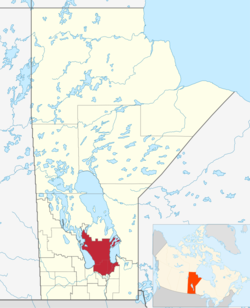Interlake Region | |
|---|---|
 Map of the Interlake Region of Manitoba. | |
| Country | Canada |
| Province | Manitoba |
| Area | |
• Total | 15,858.13 km2 (6,122.86 sq mi) |
| Population | |
• Total | 98,028 |
| • Density | 6.1816/km2 (16.010/sq mi) |
The Interlake Region is an informal geographic region of the Canadian province of Manitoba that lies roughly between Lake Winnipeg and Lake Manitoba.
Contents
- Geography
- Climate
- Demographics
- Major communities
- Census subdivisions
- See also
- References
- References 2
- External links
The region comprises 14 rural municipalities, one city (Selkirk), six towns (Arborg, Riverton, Stonewall, Gimli, Teulon and Winnipeg Beach), and one village (Dunnottar). The largest population centre in the region is Selkirk, and the second largest is the town of Stonewall.
Argyle is a small hamlet that is located on the Principal Meridian of Canada, near the middle of the Interlake Region. Sandy Hook is located between Winnipeg Beach and Gimli, a popular summer vacation spot.